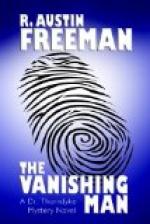“It seems as if he wished, for some reason, to divide the body into definite anatomical regions.”
Thorndyke chuckled. “You are not offering that suggestion as an explanation, are you? Because it would require more explaining than the original problem. And it is not even true. Anatomically speaking, the knee-cap appertains to the thigh rather than to the shank. It is a sesamoid bone belonging to the thigh muscles; yet in this case it has been left attached, apparently, to the shank. No, Berkeley, that cat won’t jump. Our unknown operator was not preparing a skeleton as a museum specimen; he was dividing a body up into convenient-sized portions for the purpose of conveying them to various ponds. Now what circumstances might have led him to divide it in this peculiar manner?”
“I am afraid I have no suggestion to offer. Have you?”
Thorndyke suddenly lapsed into ambiguity. “I think,” he said, “it is possible to conceive such circumstances, and so, probably, will you if you think it over.”
“Did you gather anything of importance from the evidence at the inquest?” I asked.
“It is difficult to say,” he replied. “The whole of my conclusions in this case are based on what is virtually circumstantial evidence. I have not one single fact of which I can say that it admits only of a single interpretation. Still, it must be remembered that even the most inconclusive facts, if sufficiently multiplied, yield a highly conclusive total. And my little pile of evidence is growing, particle by particle; but we mustn’t sit here gossiping at this hour of the day; I have to consult with Marchmont and you say that you have an early afternoon engagement. We can walk together as far as Fleet Street.”
A minute or two later we went our respective ways, Thorndyke towards Lombard Street and I to Fetter Lane, not unmindful of those coming events that were casting so agreeable a shadow before them.
There was only one message awaiting me, and when Adolphus had delivered it (amidst mephitic fumes that rose from the basement, premonitory of fried plaice), I pocketed my stethoscope and betook myself to Gunpowder Alley, the aristocratic abode of my patient, joyfully threading the now familiar passages of Gough Square and Wine Office Court, and meditating pleasantly on the curious literary flavour that pervades these little-known regions. For the shade of the author of Rasselas still seems to haunt the scenes of his Titanic labours and his ponderous but homely and temperate rejoicings. Every court and alley whispers of books and of the making of books; forms of type, trundled noisily on trollies by ink-smeared boys, salute the wayfarer at odd corners; piles of strawboard, rolls or bales of paper, drums of printing-ink or roller-composition stand on the pavement outside dark entries; basement windows give glimpses into Hadean caverns tenanted by legions of printer’s devils; and the very air is charged with the hum of press and with odours of glue and paste and oil. The entire neighbourhood is given up to the printer and binder; and even my patient turned out to be a guillotine-knife grinder—a ferocious and revolutionary calling strangely at variance with his harmless appearance and meek bearing.




